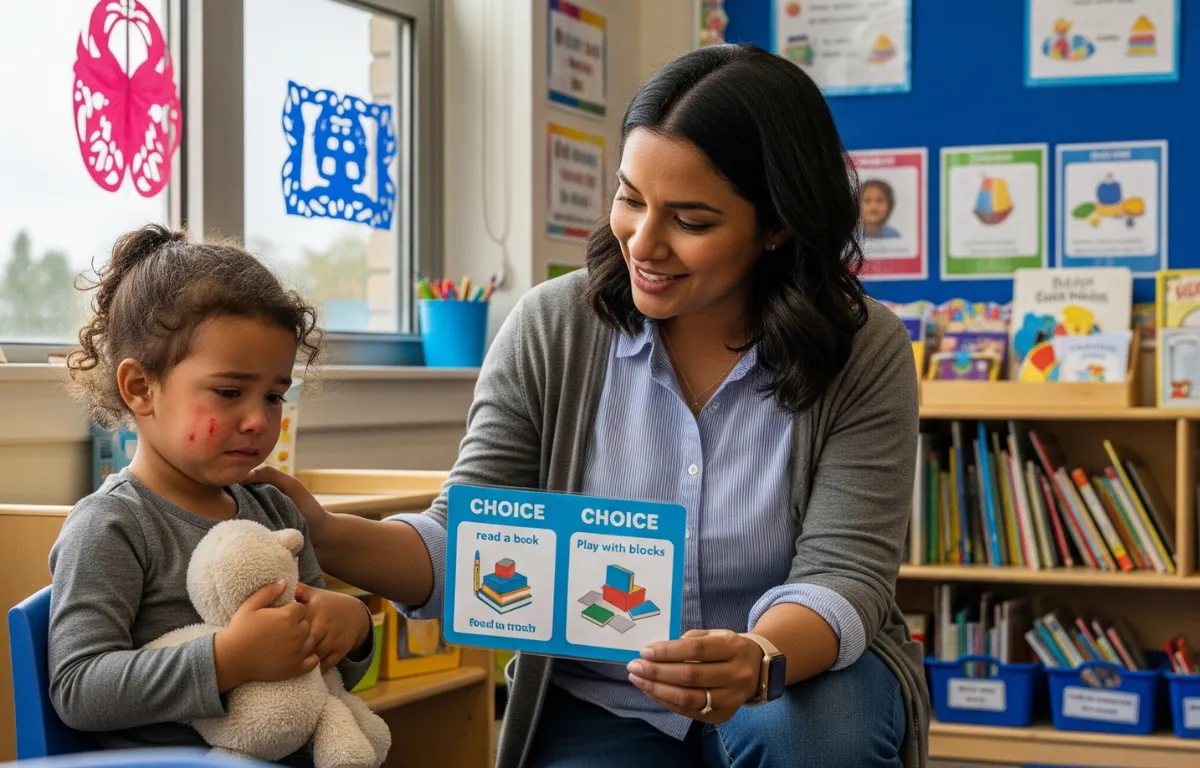
Handling “Bad Behavior” Without Yelling: Positive Discipline Strategies

Handling “Bad Behavior” Without Yelling: Positive Discipline Strategies
Chroma Early Learning Academy — McDonough Campus
Children misbehave. It’s part of growing up. What matters is how we respond. Yelling can feel like the quickest tool, but it often leads to shame, fear, or resentment—not better behavior. At Chroma, we believe in building trust, teaching self-regulation, and working with behaving challenges as chances for growth. Here are strategies for positive discipline, gentle consistency, and ways McDonough parents can partner with our academy to create a nurturing environment.
Why Positive Discipline Matters
Encourages emotional awareness: children learn to identify feelings like frustration, disappointment, or jealousy rather than simply acting them out.
Builds intrinsic motivation: children develop internal reasons for behaving well, instead of obeying out of fear.
Strengthens relationships: respectful boundaries + empathy lead to trust.
Long-term benefits: better social skills, self-control, resilience. (Not just quieter moments, but more capable children.)
Key Strategies for Positive Discipline
Here are concrete tools to handle behavior without resorting to yelling:
Set Clear and Consistent Expectations
Children do better when they know the rules in advance. For instance, “We use walking feet inside,” “We share toys,” “We raise hands to speak.” Review rules often, especially after breaks or weekends. Pabrio+1Use Natural and Logical Consequences
Instead of punishments that feel arbitrary, let consequences follow behavior in a way the child can understand. If a child paints on the walls, they help clean up. If they refuse to put away blocks, blocks stay out of reach during clean-up time. Consequences should be safe, fair, and connected to the behavior. BeAKid+1Offer Choices Within Limits
“Do you want to put on your shoes now, or after breakfast?” gives the child some control but you still set the boundary. This helps reduce power struggles. Pabrio+1Redirect & Reframe Behavior
Instead of simply saying “Don’t do that,” show what can be done. If a child is hitting, you might say, “Hands are for helping or hugging. Let's use gentle hands.” Then give them something positive to do. The Parenting Pro+1Model Self-Control & Empathy
Kids watch adults more than they listen. If you stay calm, use respectful tone, apologize when you’re frustrated, children learn that it’s okay to have big feelings—and they learn how to handle them. GreatSchools.orgPraise Proactively
Catch them being good. Acknowledge when they share, when they use words instead of pushing, when they help. Specific praise (“I appreciate how you asked before grabbing that toy”) reinforces good behavior more than general (“Good job”). BeAKid+1Time-Ins Instead of Time-Outs (When Possible)
For younger children especially, instead of putting them away in time-out, bring them close, help them label their feelings, calm down together. Then discuss better choices. This reinforces connection.
How Chroma McDonough Implements These Principles
Teachers are trained to intervene gently: redirect first, then use logical consequences, never raising voices.
Behavior expectations posted in classrooms, revisited regularly.
Regular check-ins with families: we want to know what works at home so we can be consistent together.
Celebrations of positive behaviors in class (verbal praise, small rewards like extra story time), rather than just marking misbehavior.
Tips for Parents at Home
Keep your cool. When you feel a surge of anger, take a breath, count to five, maybe step away briefly—children benefit when they see controlled responses.
Choose your battles. Not every behavior worth correcting now; some are part of their development.
Build emotional vocabulary: help kids name feelings (“You seem frustrated that you can’t play with that toy right now”). Gives them tools for self-regulation.
Use stories or role-play: favorite characters perhaps make mistakes and then show better choices.
When to Reach Out for Extra Support
If misbehavior is very frequent, aggressive, seems beyond what you'd expect for age/stage, or causing disruption in many settings (home, school, etc.), it might help to consult child behavior specialists or psychologists. We at Chroma can assist in referrals and partnering with you.
Local McDonough Businesses That Boost Family Life
Connecting to our local community not only enriches children’s lives, but supports parents in their discipline journey. Here are some nearby businesses that families love:
South Point Mall- Great place for calm family outings: letting kids pick a treat or simply walk stores can serve as positive reinforcement after a challenging school day.
Pasta Max Cafe (on Main Street McDonough)- Comfortable setting for parent-meetups or “behavior plan” discussions over a meal.
Queen Been Coffee- A cozy escape for parent self-care—sometimes staying calm as parent requires breathing space. Coffee + calm moment helps reset.
Maxx 213 Southpoint Boulevard- Shopping for tools—books, games, art supplies—that support positive discipline (emotional learning games, social skills books).
Bottled Treasures Olive Oils- Unique boutique to browse with kids; can be part of rewards or special moments celebrating positive behavior.
Takeaway
Positive discipline without yelling is about teaching, not punishing. It requires patience, consistency, empathy—and the belief that children are capable of learning respect, kindness, and self-control. At Chroma Early Learning Academy in McDonough, we partner with families to shape this environment: consistent expectations, respectful boundaries, plenty of encouragement, and real opportunities for growth.
Every time we choose calm over yelling, we’re not just stopping bad behavior—we’re showing children a better way to be in the world. https://www.chromaela.com/service-areas-mcdonough-ga